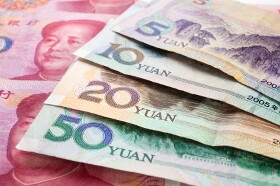The Chinese yuan is weakening slightly against the US dollar to kick off the trading week, despite strong economic data. The yuan had been finding support on a better-than-expected rebound, as well as confidence in the broader financial markets. Whatever happens, it appears that the yuan on track for further appreciation in the second half of 2020, which is what some analysts had forecast.
According to the National Bureau of Statistics (NBS), the manufacturing purchasing managersâ index came in at 51.1 in July, up from 50.9 in June. The market had penciled in a reading of 50.7. This was the fifth consecutive month of higher factory activity, and it was the best monthly performance since March. The official government numbers reported gains in output, new orders, buying levels, and input costs. There was, however, a soft decline in export sales and employment. But overall business sentiment grew to 57.8, from 57.5 in the previous month.
The NBS non-manufacturing PMI dipped from 54.4 in June to 54.2 in July, but it was still the fifth straight of expansion in the services sector. Although foreign sales and employment shrank, there was a bump in new businesses, suppliersâ delivery time, and prices. Sentiment also spiked from 60.3 to 62.2.
Meanwhile, the private sector PMI reading from Caixin clocked in at 52.8 in July, up from 51.2 in June. The median estimate was 51.3. This was the third consecutive expansion in factory activity and the sharpest gain in close to a decade. Output, new orders, buying levels, and prices expanded, but this was offset by a contraction in export orders and employment.
Caixin will also publish the services and composite PMI on Tuesday.
Later this week, trade, foreign exchange reserves, and inflation data will be released.
On Friday, the Peopleâs Bank of China (PBoC) announced that it would postpone its new asset management rules that were proposed to reduce risks in the lending market. According to a statement, the PBoC confirmed it would give the banking system an additional year to adapt to the new rules, allowing enough time to adapt to the new rules, especially after the COVID-19 pandemic.
The PBoC recently required financial institutions to put aside more capital for loans that have been repackaged as investment products. These new rules would also prevent risks from shadow banking activities. The latest regulatory reforms were supposed to be implemented by the end of the year.
The USD/CNY currency pair rose 0.13% to 6.9841, from an opening of 6.9752, at 13:34 GMT on Monday. The EUR/CNY tumbled 0.52% to 8.1745, from an opening of 8.2157.
If you have any questions, comments, or opinions regarding the Chinese Yuan, feel free to post them using the commentary form below.
USD/CNY Trends in 6.9 Range Amid Strong PMI Readings
